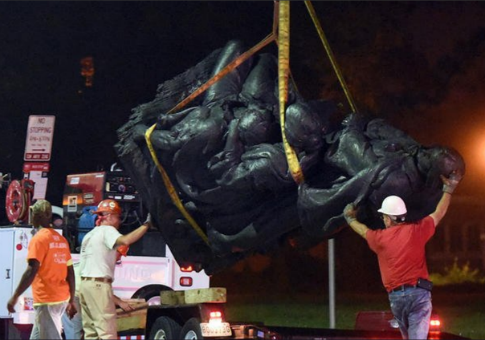Four Confederate statues were swiftly removed in Baltimore during the early hours of Wednesday morning, days after violence erupted over the weekend in Charlottesville, Va. due to the removal of another Confederate monument there.
Baltimore Mayor Catherine Pugh ordered a contingent of local police officers to remove the statues early Wednesday after the City Council voted on Monday for them to be removed, the New York Times reported.
By 3:30 a.m., three of the city's four monuments had been removed. They included the Robert E. Lee and Thomas J. "Stonewall" Jackson Monument, a double equestrian statue of the Confederate generals erected in 1948; the Confederate Soldiers and Sailors Monument, erected in 1903; and the Roger B. Taney Monument, erected in 1887.
Taney was a Supreme Court chief justice and Maryland native who wrote the landmark 1857 decision in the Dred Scott case, ruling that even free blacks had no claim to citizenship in the United States. Although Taney was never part of the Confederacy, the court’s decision was celebrated by supporters of slavery.
The fourth statue, the Confederate Women's Monument, was dedicated in 1917. Pictures showed that it too had been taken down early on Wednesday.
There were small crowds that showed up for the removal of the statues, which Baynard Woods, editor at large of the Baltimore City Paper, described as "celebratory."
"The police are being cheerful and encouraging people to take photos and selfies," Woods said in an interview.
A Twitter user, James MacArthur, live-streamed the removal of the Lee and Jackson monuments for over two hours as they were "unceremoniously torn from its pedestal and strapped to a flatbed truck," according to the Times.
Residents were seen celebrating on the pedestal, on which someone had spray-painted "Black Lives Matter."
A team of police cars escorted the statues out of town. Ms. Pugh suggested on Monday that the statues might be relocated to Confederate cemeteries elsewhere in the state. (Although Maryland never seceded from the Union during the Civil War, there was popular support for the Confederacy in Baltimore and Southern Maryland, where Confederate soldiers are buried.)
One city councilman said the statues should be destroyed, not just moved.
— brandon soderberg (@notrivia) August 16, 2017
And there they go. Lee and Jackson sailing through air onto flatbed truck in Baltimore at 3:40 AM. An amazing sight. pic.twitter.com/4SzRYRiVOB
— Alec MacGillis (@AlecMacGillis) August 16, 2017
"These people were terrorists. They were traitors. Why are we honoring them?" Councilman Brandon M. Scott said on Monday.
Baltimore had been studying the controversial issue of removing Confederate monuments since 2015, but there was renewed debate across the South and cities with such statues after a white supremacist shot and killed nine people at a historic black church in Charleston, S.C.
Baltimore's decision to remove the statues came just days after a group of protesters made up of "alt-Right" activists and white supremacists demonstrated in Charlottesville against the removal of a Lee statue and a park being renamed "Emancipation Park." The demonstrations turned violent, ultimately leaving a woman dead after a man rammed his car into a crowd of counter-protesters. The suspect, James Fields, has ties to extreme, alt-right views.
Trump received backlash over the weekend after his initial response condemning violence in Charlottesville seemed to reference fault on "many sides." Many lawmakers and reporters thought Trump did not go far enough in condemning white supremacists and neo-Nazis. While Trump's condemnation of racism and white supremacy was stronger on Monday morning, the backlash was still strong from his initial response.
